Uncover the complex biblical definitions of virginity, revealing a topic rich with cultural and religious significance that challenges modern understandings.

Definition of Virginity in the Bible
You might not be aware, but the concept of virginity in the Bible isn't as straightforward as you'd think. The ancient texts use various terms and contexts to discuss virginity, reflecting its multifaceted cultural and religious significance.
From the Old Testament's legal and symbolic references to the New Testament's more nuanced perspectives, there's a rich tapestry of meanings that often goes overlooked. As we explore these biblical views, you'll discover how historical interpretations have shaped our modern understanding and why this topic remains relevant and debated among scholars and believers alike.
This journey will uncover layers of meaning that challenge and deepen our grasp of virginity's role in biblical narratives.
Key Takeaways
- The Bible portrays virginity as a symbol of purity and spiritual integrity.
- Virginity is intertwined with societal and marital expectations in biblical narratives.
- Mary's virginity is highlighted, emphasizing the significance of purity.
- Interpretations of virginity in the Bible vary, reflecting theological and cultural perspectives.
Biblical Terms for Virginity
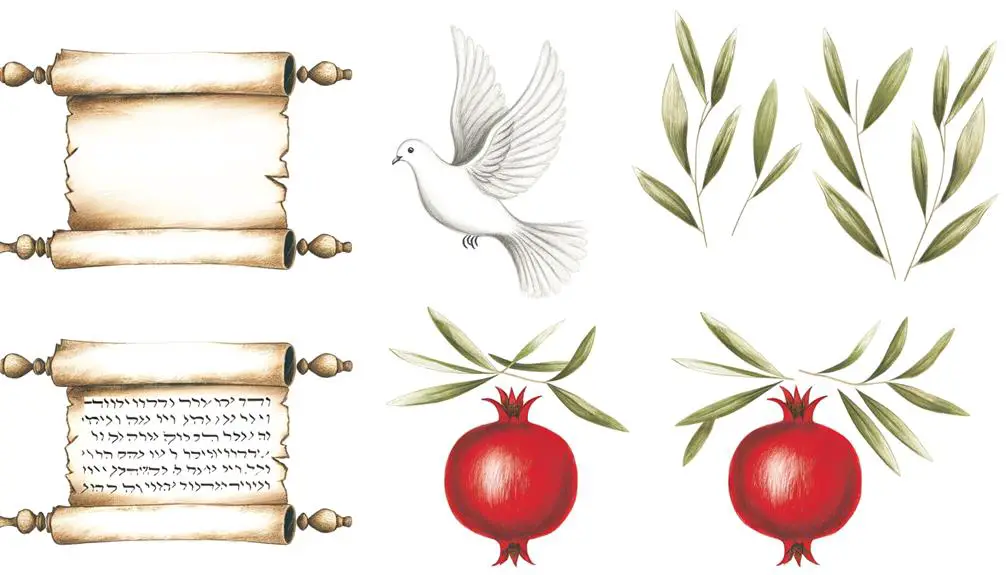
In exploring the concept of virginity within the biblical context, it's crucial to understand the specific terms and phrases employed in the Scriptures to denote this state. The Hebrew Bible and the New Testament use a variety of terms that have been translated as 'virgin' or relate to virginity, each with its own nuances and contexts. These terms are foundational in comprehending how virginity is framed within biblical teachings and how it intersects with cultural and religious practices, such as virginity pledges and purity codes.
Virginity pledges, commitments made by individuals to abstain from sexual intercourse until marriage, find a conceptual foundation in the biblical understanding of virginity. These pledges are often supported by contemporary Christian communities as a way to uphold the purity codes emphasized in Scripture. These purity codes, while not explicitly named in the Bible, are derived from various laws and teachings that emphasize sexual purity and moral conduct, reflecting a broader biblical worldview that values virginity prior to marriage.
Analyzing the Bible, you'll find that virginity isn't only a physical condition but also a moral and spiritual aspiration, deeply rooted in the fabric of biblical teachings. The emphasis on virginity within the Bible serves as a guide for personal conduct and is often linked to ideas of purity and holiness, resonating through the ages in the formation of purity codes and the practice of taking virginity pledges.
As you delve deeper into biblical teachings, it's evident that the concept of virginity transcends mere physicality, embodying a commitment to purity and faithfulness that's cherished within the faith community. This scholarly exploration offers a faith-based insight into how virginity is both a personal pledge and a community-oriented code, deeply embedded in the biblical tradition.
Virginity in Old Testament Contexts
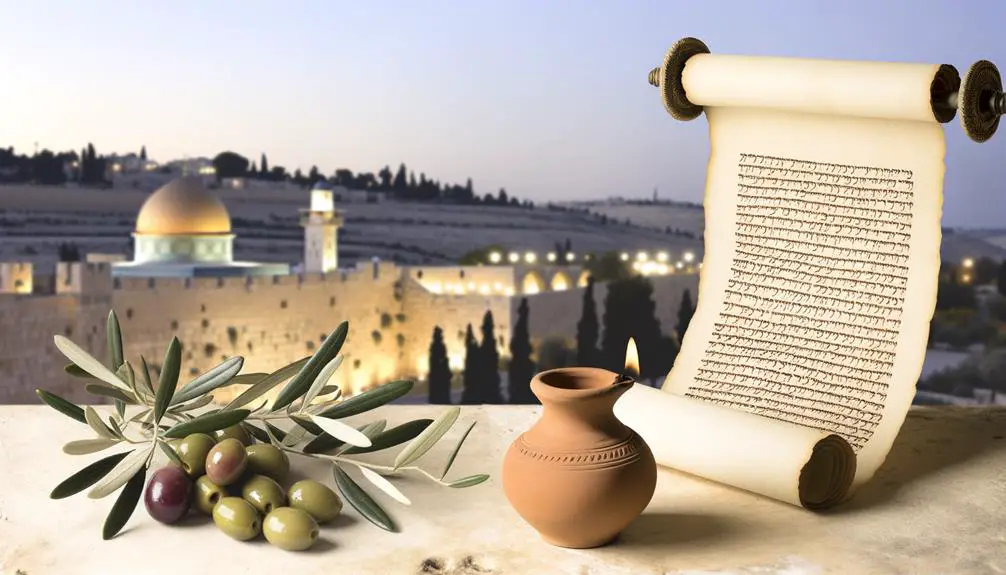
Exploring the Old Testament, you'll find that virginity isn't only esteemed but intricately linked to societal norms and religious practices of the time. The concept of virginity extends beyond personal purity, embedding itself within the legal and spiritual framework of ancient Israelite society.
Through a scholarly and analytical lens, let's delve into the significance of virginity in the Old Testament, focusing on:
- Dowry Laws: The Old Testament contains specific references to dowry laws that underscore the value placed on virginity. For instance, Exodus 22:16-17 outlines the expectations for a man who seduces a virgin. This law not only serves as a protection for the woman but also emphasizes her value through the requirement of a dowry, a practice deeply rooted in the cultural and economic realities of the time.
- Consecration Rites: Virginity held a spiritual significance that transcended the personal level, affecting communal and religious practices. The consecration of virgins, found in Numbers 30:3-16, illustrates how virginity was intertwined with vows made to God. These rites highlight the deep connection between physical purity and spiritual dedication in the Old Testament.
- Social and Familial Honor: Virginity was closely tied to the honor of the individual and their family. Deuteronomy 22:13-21 provides a legal framework that protects this honor, detailing the consequences of false accusations against a woman's virginity. This underscores the importance of virginity as a marker of social status and moral integrity within the community.
In the Old Testament context, virginity was much more than a personal attribute; it was a multifaceted concept that influenced legal, religious, and social spheres, reflecting the complex interplay between individual purity and communal values.
New Testament Perspectives

As you explore the New Testament's perspectives on virginity, you'll find that Mary's virginity is significantly highlighted as a symbol of divine intervention and purity. This section further examines how virginity and spiritual purity are intricately linked, offering insights into the broader Christian ethos of holiness.
Additionally, through parables, the New Testament imparts crucial lessons on virginity, emphasizing its value and implications for faith and spiritual readiness.
Mary's Virginity Highlighted
Mary's virginity, a cornerstone of Christian doctrine, is vividly underscored in the New Testament, presenting a unique theological perspective on purity and divine intervention. This aspect of Mary's life not only serves as a testament to her faith and obedience but also illuminates the miraculous nature of Jesus' birth. The emphasis on her virginity before and at the time of Jesus' conception underscores several key themes:
- Miraculous Conception: Highlighting the supernatural aspect of Jesus' birth, which defies natural law and human understanding.
- Prophecy Fulfillment: Aligning with Old Testament prophecies regarding the virgin birth of the Messiah, confirming Jesus' divine origins and mission.
- Divine Selection: Mary's purity and virginity symbolize her selection by God for a unique role in salvation history, underscoring the interplay between divine will and human obedience.
Virginity and Spiritual Purity
In the New Testament, virginity transcends its physical aspect to embody spiritual purity, signifying a profound connection with divine sanctity. This perspective elevates the concept beyond mere abstinence, aligning it with purity rituals and sexual ethics that are deeply rooted in one's spiritual journey.
The emphasis isn't solely on physical purity but also on the purity of heart and mind, reflecting a commitment to live according to God's will. Through this lens, virginity becomes a symbol of devotion and a reflection of one's inner sanctity, challenging believers to pursue purity in all aspects of life.
This understanding encourages a holistic approach to sexual ethics, viewing them as integral to one's spiritual integrity and relationship with the divine.
Parables and Virginity Lessons
Building on the understanding of virginity as a symbol of spiritual purity, the New Testament offers several parables and teachings that further explore this concept, providing believers with practical lessons on living a life of devotion and purity.
In analyzing these parables, you'll encounter:
- Virginity metaphors that liken spiritual readiness and purity to the state of being virgin, emphasizing preparation and vigilance.
- Parable analysis reveals deeper layers of meaning, teaching believers the importance of maintaining spiritual purity in anticipation of Christ's return.
- Insights into how these teachings apply to everyday life, encouraging you to embody purity and watchfulness in your faith journey.
This nuanced understanding enriches your spiritual walk, highlighting the vital role of purity and preparedness in your relationship with God.
Symbolic Representations of Virginity

Throughout biblical scripture, virginity emerges as a potent symbol of purity and divine favor, often shaping narratives and influencing theological interpretations. This representation is deeply woven into the fabric of both individual and collective spirituality, reflecting a broader understanding of sacredness and commitment. Virginity myths, deeply embedded within these texts, serve not only as moral compasses but also as reflections of the societal impacts of purity.
Virginity's portrayal in the Bible transcends mere physical status, embodying ideals of spiritual wholesomeness and dedication to God's will. This symbolic interpretation elevates virginity to a metaphorical plane, where it signifies a life untainted by sin and wholly devoted to divine purposes. The narratives surrounding virginity in scripture frequently underscore the value placed on purity before God, illustrating how this concept has been pivotal in shaping moral and ethical standards within religious communities.
The societal impacts of these virginity myths can't be understated. They've played a crucial role in guiding behavior, informing cultural norms, and shaping the collective conscience of believers. This veneration of virginity has influenced not only personal choices but also communal practices, dictating interactions and expectations within the faithful community. As a symbol, virginity conveys a message of consecration and sacrifice, principles that remain central to faith-based living.
In examining the symbolic representations of virginity in biblical scripture, you're delving into a complex interplay of theology, morality, and societal values. These narratives offer a window into understanding how concepts of purity and dedication have been valorized, shaping the spiritual landscape of believers through the ages.
Virginity and Marriage Traditions
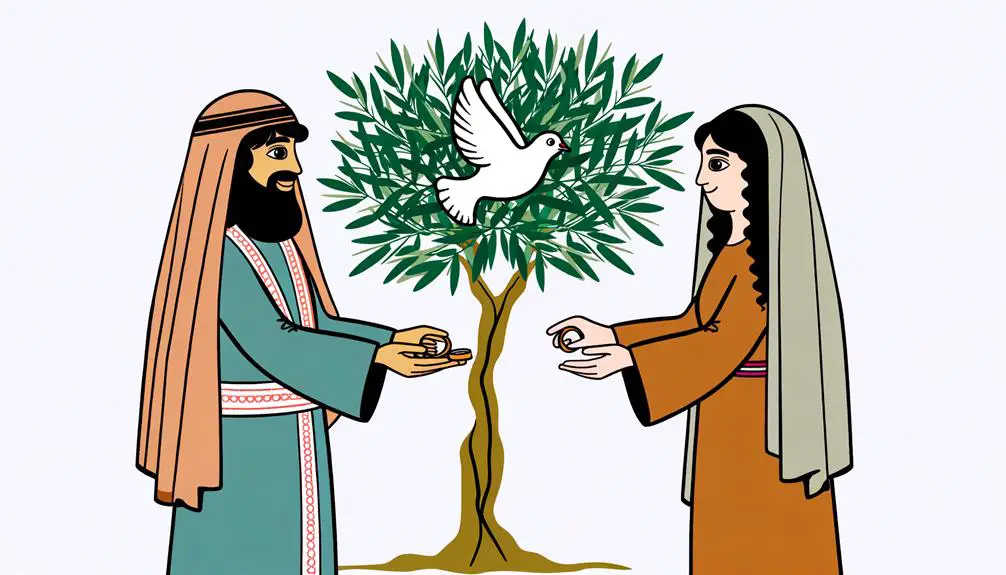
As you explore the topic of virginity in biblical contexts, it's crucial to understand how virginity and marriage traditions intertwine.
Biblical marriage expectations and cultural practices offer a rich tapestry for analysis, revealing both historical and spiritual dimensions.
This examination sheds light on how faith communities have interpreted and lived out these ideals through ages.
Biblical Marriage Expectations
In biblical times, the expectation of virginity until marriage was deeply ingrained within societal norms and religious teachings, reflecting a covenant not only between individuals but also with God. This covenant was underpinned by several key practices:
- Conjugal Rights: Marriage conferred specific rights and duties, central among them the right to engage in sexual relations, which were to be exercised exclusively within the marital bond.
- Dowry Customs: Dowries were an integral part of marriage agreements, symbolizing the value and purity of the union.
- Fidelity Expectations: Both parties were expected to enter the marriage untouched, symbolizing their commitment and faithfulness to each other and to God.
These practices collectively underscored the sacredness of marriage, emphasizing its role as a divine institution.
Cultural Practices Examined
Examining the cultural practices surrounding virginity and marriage traditions reveals a rich tapestry of beliefs and rituals that underscore their significance within biblical communities. These virginity rituals, deeply embedded in the social fabric, not only marked the transition of youth into adulthood but also served as a testament to familial honor and spiritual purity.
The gender implications are profound, with differing expectations placed on men and women, reflecting broader societal norms and values. These practices, steeped in faith, underscore the interconnectedness of religion, culture, and personal identity, highlighting the pivotal role virginity played in shaping individual destinies and community cohesion.
As you delve deeper into these traditions, you uncover layers of meaning that illuminate the complex interplay between faith, purity, and societal expectations.
Modern Interpretations and Debates
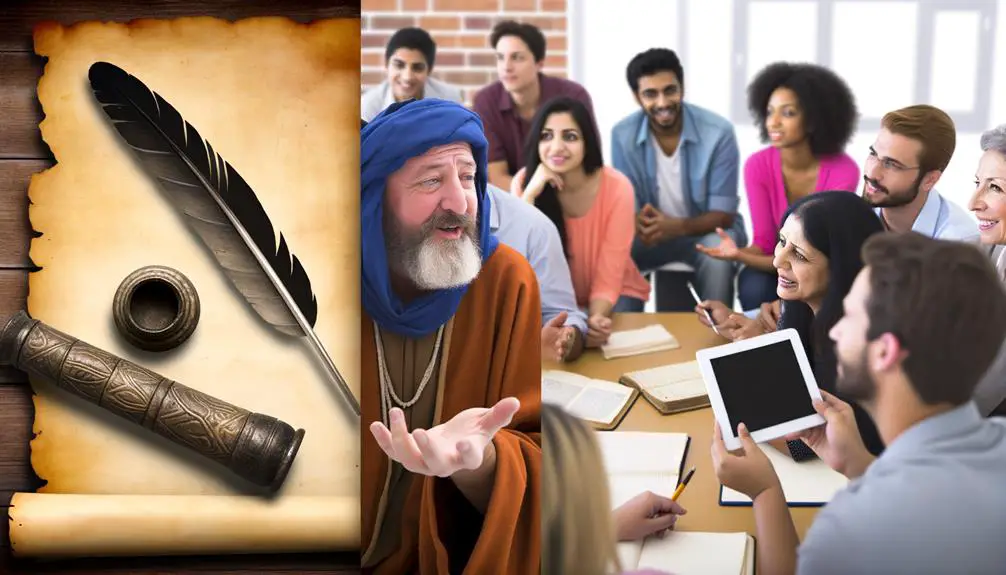
Contemporary debates on virginity in the Bible often revolve around its interpretation and relevance in today's society, challenging believers and scholars alike to reconsider traditional views. Key among these discussions is the need for a virginity redefinition, sparking contemporary discussions that delve into how ancient texts should inform modern faith and morality.
As you navigate these complex debates, it's essential to consider several critical points:
- The Evolution of Societal Norms: Modern society doesn't mirror the ancient contexts in which biblical texts were written. This discrepancy raises questions about how to apply teachings on virginity in a way that respects both historical contexts and contemporary values.
- Interpretative Variability: Different Christian denominations interpret biblical scriptures on virginity in various ways. This diversity reflects broader theological debates about scriptural authority, interpretation, and application in believers' lives.
- The Role of Personal Faith: Ultimately, how you understand and integrate the Bible's teachings on virginity into your life is deeply personal. It involves not just a scholarly interpretation of texts but also a prayerful consideration of what those teachings mean for your journey of faith.
In engaging with these debates, you're invited to explore how ancient wisdom can guide modern living. This journey requires a balance between reverence for tradition and openness to new understandings. By critically and faithfully engaging with the Bible's teachings on virginity, you can contribute to a more nuanced and compassionate conversation that respects both the past and the present.
Frequently Asked Questions
How Do Different Christian Denominations Interpret the Concept of Virginity in Contemporary Religious Practices?
You'll find that various Christian denominations interpret virginity differently in their contemporary religious practices. Some emphasize purity rituals and marriage customs, viewing virginity as a symbol of spiritual purity.
Others adopt a more nuanced perspective, focusing on the intention and heart behind actions. This diversity reflects a broader theological conversation about faith, morality, and the role of tradition in shaping believers' lives and choices.
Are There Specific Biblical Passages That Have Been Reinterpreted Over Time to Fit Modern Views on Virginity?
Yes, specific biblical passages have evolved in their interpretation to align with modern perspectives on virginity, reflecting shifts in cultural symbolism and interpretive translations.
Scholars and theologians meticulously analyze texts to understand their nuanced meanings in contemporary contexts.
This process reveals how interpretations aren't static but adapt over time, highlighting the dynamic relationship between faith, culture, and scholarly analysis in redefining concepts like virginity for today's believers.
How Have Feminist Theologians Addressed the Concept of Virginity in the Bible?
Feminist theologians have delved deep into the scriptures, unraveling threads of gender dynamics woven into ancient texts. They critique traditional interpretations, arguing that these often stem from patriarchal views rather than divine intent.
In What Ways Has the Historical Understanding of Virginity in the Bible Influenced Legal Systems and Policies in Predominantly Christian Societies?
You're exploring how historical interpretations of virginity have shaped legal and policy frameworks in Christian-majority societies.
Specifically, marital laws often reflect these traditional views, dictating the terms around marriage and sexual conduct.
Similarly, health policies may carry underlying moral judgments rooted in these beliefs, affecting education and reproductive rights.
This intertwining of faith and governance reveals a complex legacy, where religious doctrines continue to influence contemporary societal norms and legal standards.
What Are the Psychological and Social Impacts of the Biblical Concept of Virginity on Individuals in Christian Communities Today?
You're grappling with how the concept of virginity impacts individuals in Christian communities today.
This deep-rooted idea can lead to a virginity stigma, affecting your sexual health and self-perception.
It's not just about physical status but carries psychological and social weight, shaping your identity and relationships.
Understanding this influence helps you navigate these pressures, advocating for a more compassionate and informed approach to discussing and dealing with matters of sexual health and morality.
Conclusion
As you've journeyed through the scriptural landscapes, from the Old Testament's historical paths to the New Testament's revolutionary trails, you've seen how virginity, a seemingly simple concept, is woven with complex threads in the Bible.
It's a tapestry of purity, promise, and profound symbolism. Remember, this dialogue between divine word and human interpretation is a living river, ever-flowing and ever-reflecting the changing skies of societal beliefs and personal faith.
In this sacred exchange, you're invited to find your reflection, understanding that purity transcends physicality, touching the soul's very essence.

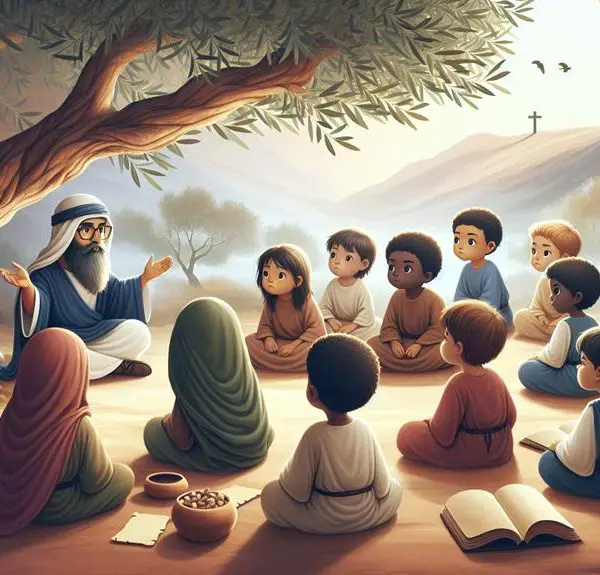

Sign up